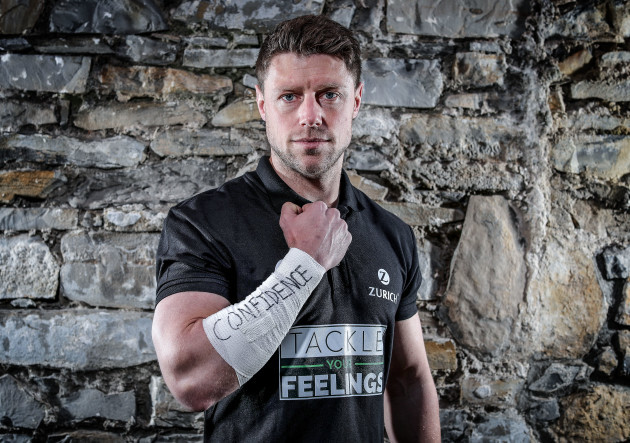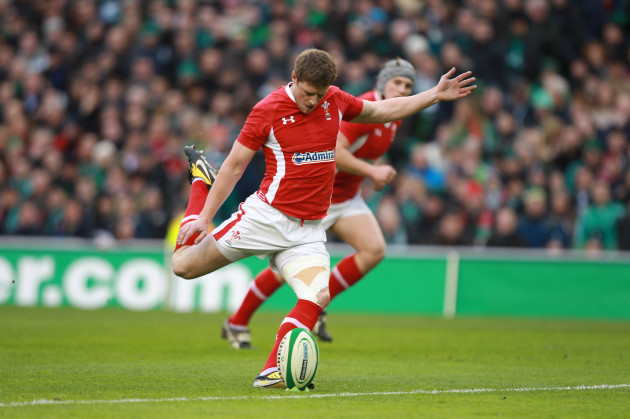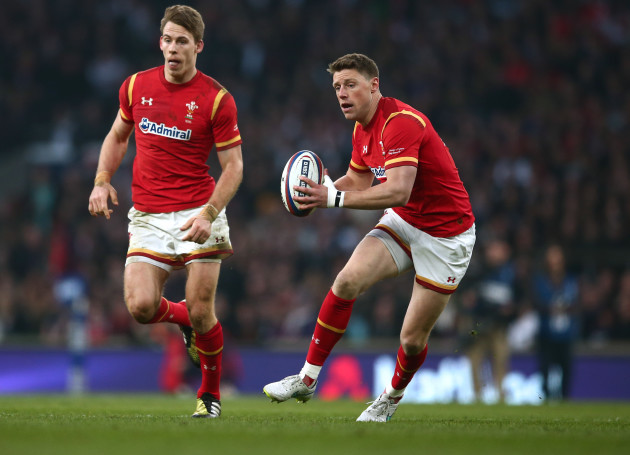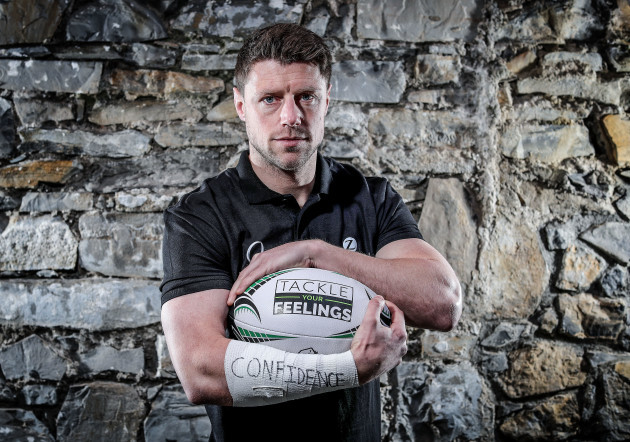PEAKS AND TROUGHS, ups and downs. They’re not mutually exclusive in the context of a single season, let alone a career, and for Rhys Priestland — the Welsh out-half — memories of Dublin evoke vastly contrasting emotions.
There have been good days and bad days, as is expected in professional rugby, but the bad ones stick in the mind that bit more. Negatives weigh heavier, even if subconsciously they’ve been left in the rearview mirror.
2014 was a low point. Wales were outplayed and overpowered by Joe Schmidt’s side, who lay down a significant marker of intent before going on to be crowned Six Nations champions. 26-3 was an accurate reflection of Ireland’s dominance that day.
“They were much better than us all around the park,” Priestland recalls.
Then there was the famous draw in 2016. Wales produced a stirring comeback having trailed 13-0 after an early Ireland avalanche, before Johnny Sexton rescued the hosts with a late penalty. Priestland came off the bench after 22 minutes to replace the injured Dan Biggar, and with the game tied at 16-16, sent a drop-goal effort agonisingly wide in the final throes. He had kicked three penalties and a conversion to that point. The miss is what he remembers, though.
“We should have won that game,” the 50-time capped international laments. “Some mixed emotions from trips over here for sure.”
No more so than 2012. It’s the one that stands out, the game Priestland references when asked about this fierce, yet friendly, Celtic rivalry which will be renewed at the Aviva Stadium later this afternoon.
Wales won the Grand Slam that year, and had launched their championship with a dramatic 23-21 win in Dublin thanks to last-minute, match-winning penalty from Leigh Halfpenny. It was an epic contest, featuring five tries and a feast of high-class rugby, with Priestland playing his part.
But for all the good he did — and there were a lot of positive contributions from the Welsh number 10, including an assist for Jonathan Davies’ try – a series of poor kicks, both from hand and the tee, blotted his copybook. An otherwise impressive showing was overshadowed by the misses.
“That was the first time I played over here but a lot of mixed emotions that day,” the 31-year-old tells The42. “I missed three kicks. I had injured my knee in the last game of the Heineken Cup pool stage and it was sort of a rush to see if I was going to come back and play.
“I managed just two kicking sessions that week and things felt comfortable but when I warmed up in the game, it wasn’t great. I kicked badly that day and that’s when Leigh Halfpenny took over the kicking duties for Wales. He kicked the winning penalty. I think he owes me a bit of money for that having become one of the best kickers in the world.”
Priestland’s kicking woes were well-documented at the time, and amid criticism from fans and media, his confidence crashed. Perhaps players operating in that pivot position are placed under a greater microscope, with their every performance, and overall contribution, judged largely on kicking stats and numbers.
“I view kicking differently now compared to back then,” he continues. “I used to get really worked up about it but now I’m a lot more relaxed. I know it’s only part of my role on the pitch and that I contribute more than the place-kicking. Plus, I know I’m going to miss kicks but it’s about trying to understand that you can’t let it affect the next one.
“I’ve changed my tee as well and that’s made the world of difference to me. I’m just a lot more relaxed about it and don’t get bogged down over it.”
That wasn’t always the case, and it was towards the end of that 2012 Grand Slam-winning season when Priestland hit rock bottom. The pressure, the misses, the criticism became too much. Everything took its toll.
Defeat to Argentina and Samoa in the opening two Autumn internationals drew further criticism and plunged Priestland, who had been the target of supporters’ ire for the team’s poor form, deeper into a dark place.
“I didn’t want to play rugby anymore, I completely had enough,” he admits.
“The reason why I started playing rugby was because I loved it. It was fantastic to turn up to work every day and do something you truly enjoy but at that time in my life, I would have given everything not to play rugby. Not to turn up on the Monday and review the game and go over what went wrong.”
After Grand Slam glory, Wales lost eight consecutive Tests under interim head coach Rob Howley. Priestland, unfairly, took the brunt of the flak. Mistakes played over in his head. Two missed kicks to touch in the defeat to Argentina at Cardiff. Doubts reverberated. Demons surfaced.
“After the Samoa game was probably my lowest point. I remember speaking to Rob Howley and I said, ‘I’m not happy, I’m not looking forward to going on the field’.
“I’m going on the field and I just don’t want to make mistakes and I’ve never played like that. I knew I was so miserable and down and I didn’t want to drag everyone down with me. That’s why I kept myself to myself. It would eat me up, and I’d lock myself away.
“I remember him [Howley] asking me, ‘Do you want to play against the All Blacks?’ and I couldn’t answer him straight away, and I couldn’t believe that I had to think about things like that.”
As Priestland’s mental health deteriorated, he sought the advice of a sports psychologist, who was able to completely change his outlook not just on rugby but life’s difficulties and challenges.
“Mental health is something that I’ve struggled quite a bit with previously,” says Priestland. “If things didn’t go well for me, I’d really hide myself away and lock myself in a room. Not want to speak to anyone and it would really get me down if I didn’t play well or if we lost.
“I think it’s as you get older you develop different coping mechanisms and you realise it’s never as good as you think it is but, more importantly, it’s never as bad as you think it is. It’s trying to get that balance right.
“After that Samoa game was the first time I worked closely with a sports psychologist (Andy McCann) and he just completely changed my outlook on everything. I felt like a completely different person.
“Preparation is a big thing now. If something doesn’t work or goes wrong, there must be a reason why and I look back on that to find out why. Whereas before I didn’t want to look at it and pretend it wasn’t as bad as what it was and then it would go wrong again.
“And I was the type of guy to take things personally and it would bother me. It got me down but I realised there’s more to life than rugby. There’s a lot more to winning and losing at the weekend, even though it’s important.”
For the first time, a weight had been lifted off Priestland’s shoulders. Talking about his feelings and expressing them changed his mindset and approach to rugby, but also his attitude towards training and preparation. Speaking out helped put everything in perspective.
“I didn’t think it was a very manly thing to do, to seek help. And thankfully now there’s not so much of a stigma and people have realised how important it is to be strong mentally. It’s important to be strong in the gym, physically and tactically but just as important to be right mentally as a player and a person.”
The key for Priestland was just letting the world in — but it’s different for everybody, and he’s keen to stress it’s not a case of ‘one size fits all’ when it comes to mental health.
“I used to live with Jonathan Davies and remember telling him I was working with this psychologist and it was brilliant, but he didn’t find it helpful so it’s just down to the person. A lot more guys are willing to try it which is good but it’s just down to you and what may work for you.
“And if you surround yourself with good people, it helps a lot. If I saw someone in a similar situation now I’d do my best to try and help them out. As I got older and more experienced with different aspects of life, I’m a more well-rounded person now and can deal with those things a lot better.”
Priestland, now playing with Bath after eight years with Scarlets, is currently out injured with a hamstring problem which couldn’t have come at a more unfortunate time given how he was performing for Bath pre-Six Nations and Wales’ problems at out-half.
Nevertheless, the rehab has gone well and he hopes to be back in action by the end of next month ahead of the business end of the season with Bath pushing hard for a place in the Aviva Premiership play-offs.
“I do realise how fortunate I am to do what I love and I’m now enjoying turning up to training on a Monday,” he adds.
“I try not to let things get on top of me and that comes with age and experience, but also learning to operate on an equal level both on and off the field and not have these extreme highs or extreme lows.
“I’m a lot better at dealing with all of those things now.”
If you need to talk, please contact:
- Samaritans 116 123 or text 087 2 60 90 90
- Aware 1800 80 48 48 (depression, anxiety)
- Pieta House 1800 247 247 or email mary@pieta.ie (suicide, self-harm)
- Teen-Line Ireland 1800 833 634 (for ages 13 to 19)
- Childline 1800 66 66 66 (for under 18s)
The42 is on Instagram! Tap the button below on your phone to follow us!




